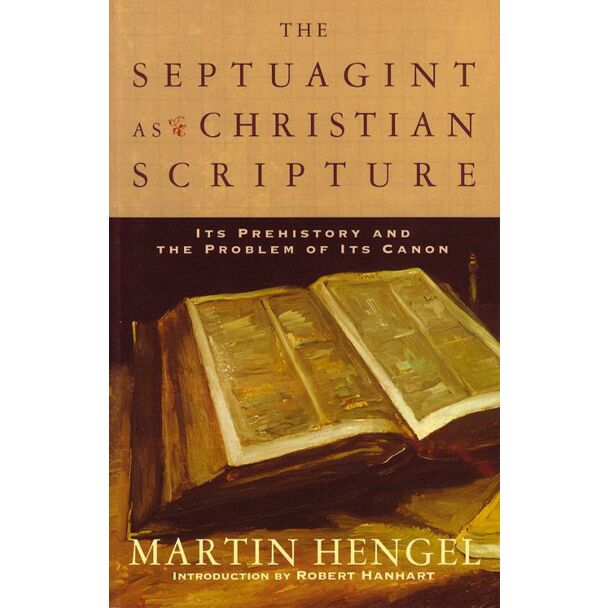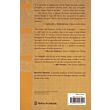The Septuagint as Christian Scripture: Its Prehistory and the Problem of Its Canon
Martin Hengel
with the assistance of Roland Deines
Introduction by Robert Hanhart
Translated by Mark E. Biddle
with the assistance of Roland Deines
Introduction by Robert Hanhart
Translated by Mark E. Biddle
Publication Data: Grand Rapids, MI: Baker Academic, 2002
Format: softcover
Number of Pages: xvi + 153
Dimensions (l × w × h): 21.6 cm × 13.9 cm × 1.4 cm
ISBN: 0‒8010‒2790‒X
Martin Hengel
with the assistance of Roland Deines
Introduction by Robert Hanhart
Translated by Mark E. Biddle
“The Septuagint is not only a unique linguistic monument without analogy in the Greek literature of antiquity[...], but it also constitutes the first complete and pre-Christian ‘commentary’ to the Old Testament. For every translation is an interpretation, and the LXX, as the first rendering of the writings of the Hebrew Bible into the Greek lingua franca, is this in an especial way. It was both the bible of primitive Christianity and the early church until well into the second century, and later it was the ‘Old Testament’ of the Greek church. Also, it fundamentally formed the theological language of oldest Christianity and, moreover, assisted in changing and leaving its mark on the spiritual world of late Antiquity.”
—“Preface”
CONTENTS
Preface
Select Bibliography
Introduction: Problems in the History of the LXX Text from Its Beginning to Origen
by Robert Hanhart
I. A Difficult Subject
II. The LXX as a Collection of Writings Claimed by Christians
1. The Translation Legend in Judaism and the Number of Translators
2. Justin
(a) The Legend in the Apology and Dialogue
(b) Justin’s ‘Old Testament Library’
(c) The Dispute about the Translation of Isaiah 7:14
(d) The Appeal to the Seventy and the Charge of Falsifying Scripture
(e) The ‘Generous’ Treatment of Minor Variants
(f) Justin’s Appeal to the Seventy in his Discussion with Jews in Rome
3. The Seventy in Later ‘Dialogues’
4. The Translation Legend in the Early Fathers after Justin
(a) Persistent Problems
(b) Pseudo-Justin’s Cohortatio ad Graecos
(c) Irenaeus
(d) Clement and Tertullian
(e) Summary
5. The Form of the Christian LXX
6. The Jewish Reaction
7. The Question of the Hebrew ‘Originals’
8. Augustine’s Attempt at Compromise
9. The Problem of the Book of Enoch
III. The Later Consolidation of the Christian ‘Septuagint Canon’
1. The First Codices: The Writings Contained in Them and Their Order
2. The Earliest Canon Lists
3. The ‘Second Class’ Character of the Writings Not Contained in the ‘Hebrew Canon’
4. The Rejection of Authentic ‘Apocrypha’
IV. The Origin of the Jewish LXX
1. The Translation of the Torah and Its Enduring Significance
2. The Translation of Other Writings
(a) Dependence on Palestinian Judaism
(b) The Translation and Origin of Individual Writings
(c) The Writings Not Found in the ‘Hebrew Canon’
3. The Canon in the Jewish Diaspora
(a) The Prologue of Jesus ben Sirach
(b) Philo’s Therapeutae
(c) Josephus: Ap 1:37–43
V. The Origin of the ‘Christian Septuagint’ and Its Additional Writings
1. Early Christianity
2. The Problem of the Inclusion of the Writings Not Contained in the ‘Hebrew Canon’
(a) Writings Outside the ‘Hebrew Canon’
(b) Independent Documents outside the ‘Hebrew Canon’
(c) The Dissemination and Prevalence of These Writings in the Church
Index of Biblical and Extra-Biblical Citations
Index of Authors
Index of Subjects
Format: softcover
Number of Pages: xvi + 153
Dimensions (l × w × h): 21.6 cm × 13.9 cm × 1.4 cm
ISBN: 0‒8010‒2790‒X
Martin Hengel
with the assistance of Roland Deines
Introduction by Robert Hanhart
Translated by Mark E. Biddle
“The Septuagint is not only a unique linguistic monument without analogy in the Greek literature of antiquity[...], but it also constitutes the first complete and pre-Christian ‘commentary’ to the Old Testament. For every translation is an interpretation, and the LXX, as the first rendering of the writings of the Hebrew Bible into the Greek lingua franca, is this in an especial way. It was both the bible of primitive Christianity and the early church until well into the second century, and later it was the ‘Old Testament’ of the Greek church. Also, it fundamentally formed the theological language of oldest Christianity and, moreover, assisted in changing and leaving its mark on the spiritual world of late Antiquity.”
—“Preface”
CONTENTS
Preface
Select Bibliography
Introduction: Problems in the History of the LXX Text from Its Beginning to Origen
by Robert Hanhart
I. A Difficult Subject
II. The LXX as a Collection of Writings Claimed by Christians
1. The Translation Legend in Judaism and the Number of Translators
2. Justin
(a) The Legend in the Apology and Dialogue
(b) Justin’s ‘Old Testament Library’
(c) The Dispute about the Translation of Isaiah 7:14
(d) The Appeal to the Seventy and the Charge of Falsifying Scripture
(e) The ‘Generous’ Treatment of Minor Variants
(f) Justin’s Appeal to the Seventy in his Discussion with Jews in Rome
3. The Seventy in Later ‘Dialogues’
4. The Translation Legend in the Early Fathers after Justin
(a) Persistent Problems
(b) Pseudo-Justin’s Cohortatio ad Graecos
(c) Irenaeus
(d) Clement and Tertullian
(e) Summary
5. The Form of the Christian LXX
6. The Jewish Reaction
7. The Question of the Hebrew ‘Originals’
8. Augustine’s Attempt at Compromise
9. The Problem of the Book of Enoch
III. The Later Consolidation of the Christian ‘Septuagint Canon’
1. The First Codices: The Writings Contained in Them and Their Order
2. The Earliest Canon Lists
3. The ‘Second Class’ Character of the Writings Not Contained in the ‘Hebrew Canon’
4. The Rejection of Authentic ‘Apocrypha’
IV. The Origin of the Jewish LXX
1. The Translation of the Torah and Its Enduring Significance
2. The Translation of Other Writings
(a) Dependence on Palestinian Judaism
(b) The Translation and Origin of Individual Writings
(c) The Writings Not Found in the ‘Hebrew Canon’
3. The Canon in the Jewish Diaspora
(a) The Prologue of Jesus ben Sirach
(b) Philo’s Therapeutae
(c) Josephus: Ap 1:37–43
V. The Origin of the ‘Christian Septuagint’ and Its Additional Writings
1. Early Christianity
2. The Problem of the Inclusion of the Writings Not Contained in the ‘Hebrew Canon’
(a) Writings Outside the ‘Hebrew Canon’
(b) Independent Documents outside the ‘Hebrew Canon’
(c) The Dissemination and Prevalence of These Writings in the Church
Index of Biblical and Extra-Biblical Citations
Index of Authors
Index of Subjects
Write Your Own Review






